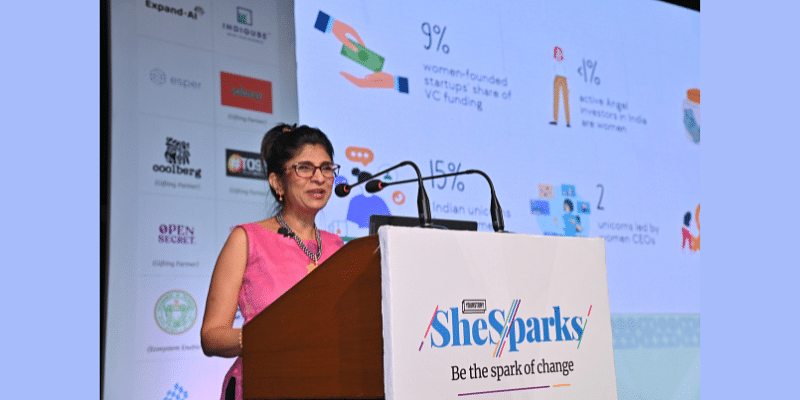Less than 1% of all institutional investments in 2021-22 went to women-led businesses, with nearly 60% of women leaders saying they faced some form of bias in the last year, according to the State of Women Entrepreneurship in India 2023 report. The report is a collaboration between YourStory and Kalaari Capital’s CXXO initiative.
The report was released by Kalaari Capital Managing Director Vani Kola at SheSparks 2023 in New Delhi on March 3, 2023.
Highlighting ecosystem gaps where women entrepreneurs struggle to find an equal footing with men, the report also revealed that while 15% of Indian unicorns have women co-founders only two unicorns are led by women CEOs, underlining the gulf in leadership representation.
Gaps in funding
Even though VC funding was marginally better than total investments in the same period at 9%, the report found a major reason for the dismal funding numbers of women-led startups was a lack of representation and diversity among investors.
Less than 1% of active angel investors in India are women, with 70% women founders saying they were the only women in the room when pitching to investors.
According to the report, the ratio of male to female investors in India is currently 10:1, with one-fifth of respondents feeling that fewer women in senior investment roles led to lack of access to institutional funding for women.
Women founders also said raising capital is the most challenging problem they face, and 43% of respondents said investor support was the most important factor to enable entrepreneurship.
Systemic challenges
Some of the main gender gap challenges the ecosystem faces include a number of systemic and personal hurdles, the report found. These include women underselling themselves, imposter syndrome, a lack of role models and women in senior investing roles, an unconscious bias against women in technology, work-life balance; and a lack of access to key networks.
However, even with these stumbling blocks, there are positive signs that have been seen over the past year. Startups with only women founders raised four times more money between January and June than in the same period last year — $118.4 million across 31 deals, up from $29.1 million across 17 deals.
Overall, women-led fintech startups saw the largest share of fundraising, raising $722.3 million, followed by D2C startups with $152.4 million, edtech startups with $107.5 million, and SaaS startups with $99.2 million.
Embracing diversity
One of the main factors that can help close the gap between women-led startups and their male counterparts is increased visibility across the ecosystem, from investors to startup leadership teams.
According to the State of Women Entrepreneurship in India 2023 report, 64% of women founders hired more women leaders, with 42% saying they monitored the ratio of women-to-men in executive roles.
In addition, other initiatives such as coaching, mentoring, and training programmes, making work culture more inclusive for women, and flexible work policies are also important.
Nearly 40% of respondents said they had training programmes for women and 48% developed more women-friendly policies, thanks to having women leaders.
This was also emphasised by Vani in her foreword to the report. “There are various small steps that we can take at all levels to improve the participation of women in our startup ecosystem and leadership roles. There are different roles and contributions that we as individuals and organisations will have to play. The role of policies that are friendly to women employees and how we apply the gender lens is also an equally important factor.”











